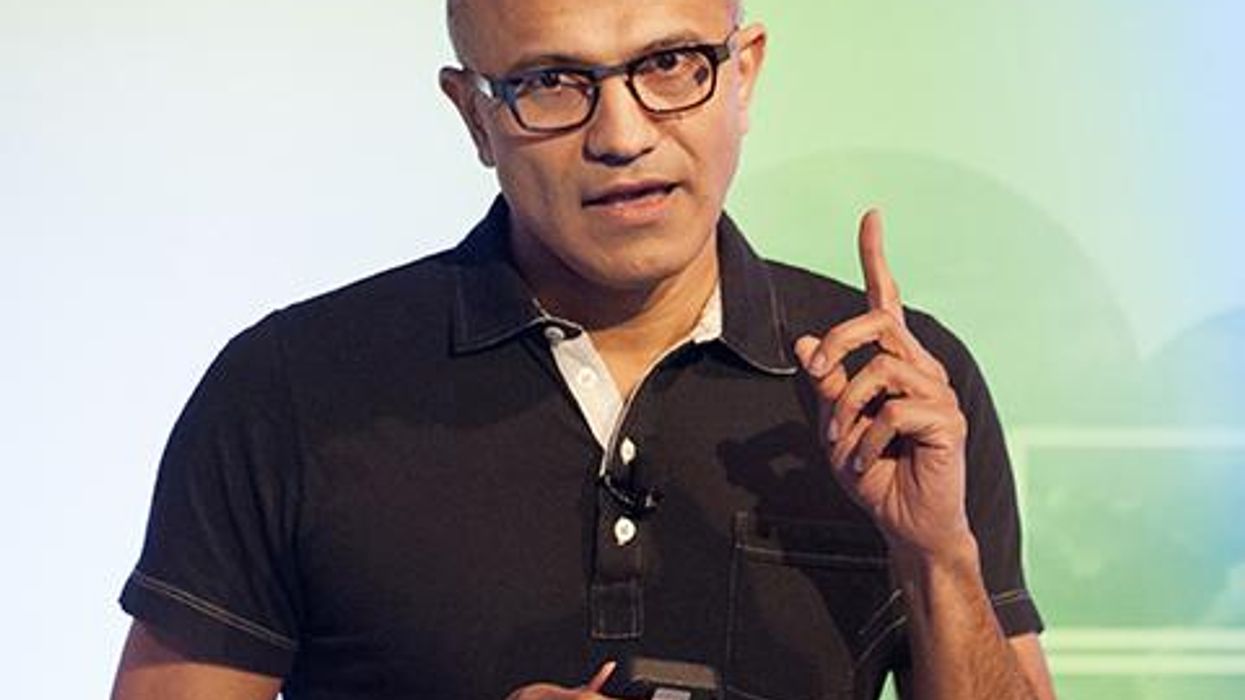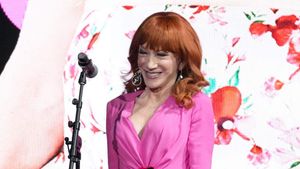Tone deaf. We use the term all the time to describe politicians who don’t understand or outright ignore their female constituents. Last week’s tone-deaf award went not to a politician, however, but to the CEO of Microsoft, Satya Nadella.
Nadella, whose salary and bonuses comprise $18 million a year, is one of the top tech CEOs in the country. On Oct. 9, Nadella was a speaker at the Grace Hopper Celebration of Women in Computing, an annual conference for women in tech. (The conference is named for Grace Hopper, Navy rear admiral and computer science genius who invented the first compiler for a computer programming language, among other massive accomplishments.)
During an on-stage interview with Maria Klawe, one of the conference organizers, Klawe asked Nadella for advice on how to ask for a raise. Studies have shown women often feel conflicted about how and when to ask for a raise because women are acculturated not to ask for things for themselves…
Nadella was succinct as he told Klawe, "It’s not really about asking for the raise, but knowing and having faith that the system will actually give you the right raises as you go along. That might be one of the initial ‘super powers,’ which quite frankly, women who don’t ask for a raise have. Because that’s good karma. It’ll come back because somebody’s going to know that’s the kind of person that I want to trust."
Yes, Nadella said that in front of nearly 8,000 people and a camera and if you were checking the year it is indeed 2014, not 1914.
Video of the exchange went viral within hours.
The next day Nadella was walking back his remarks, and posted an apology of sorts on Twitter, which read: "Was inarticulate re how women should ask for raise. Our industry must close gender pay gap so a raise is not needed because of a bias #GHC14" Nadella followed that up with an apology on his website.
Microsoft was equally quick to respond to Nadella’s comments. A memo on the company’s website included another mea culpa from Nadella "I answered that question completely wrong. I believe men and women should get equal pay for equal work. And when it comes to career advice on getting a raise when you think it’s deserved, Maria’s advice was the right advice. If you think you deserve a raise, you should just ask."
Before Nadella’s apologies, though, was the blowback. The "gaffe" as it was called, drew intense outrage on social media from women in tech and women in general. For months the Twittersphere has raged with issues about the dearth of women in tech and Nadella’s comments could not have come at a more inopportune time with the venue of women in tech underscoring his tone-deafness.
Tech in particular and the corporate world in general have been lambasted for their poor record in hiring women at any and every level. According to a recent diversity report, only 17 percent of Microsoft’s global tech employees are female. Women comprise approximately 17 percent of Microsoft’s leadership. The majority of tech companies, including Yahoo, Facebook, Google and Twitter are between 70 and 80 percent men. While women remain 52 percent of the U.S. population.
Maybe it’s Nadella who should be concerned about karma.
The raise issue is particularly germane as study after study shows women aren’t just paid less, they get fewer promotions and are hired less often in fields that are not considered "female"–like tech. What’s more, as professions are "feminized"–that is, more women than men are doing them, for example, teaching, nursing, social work, book editing, public relations and now veterinary medicine, both status and pay diminishes. Making Nadella’s comments all the more raw, if honest from a male CEO’s viewpoint.
But not everyone thought Nadella or Microsoft needed to apologize. In his Oct. 10, column, CNBC on-air tech editor Jon Fortt wrote about the incident, asserting, "Today’s tech institutions tend to believe they’re operating as color-blind, gender-blind, market-based meritocracies. And if they are correct, then Nadella'’ first statement doesn't need walking back or clarification. If you deserve a raise, you will get one, because the market will make it so."
And if they are correct.
Well, they aren’t correct, as Fortt should know. The overwhelming majority of people hired by and promoted in tech firms are white and Asian men–the India-born Nadella being a perfect example. Tech is no more color-blind and gender-blind than a KKK rally. And if that analogy seems harsh, it’s pointedly so. Nadella apologizing doesn’t answer the basic problem: Where are the women in tech? Are we supposed to believe that Hopper was a one-off? A female idiot savant who channeled computer science?
Here are some disturbing facts about the U.S., women and tech: In the U.S. there has been a steady decline in the number of women in undergraduate computer science education and upper-management information technology since the mid-1980s.
In 1984, 37.1% of Computer Science degrees were awarded to women; the percentage dropped to 29.9% in 1989-1990, and to 26.7% in 1997-1998. Figures from the Computing Research Association Taulbee Survey indicate that less than 12% of Computer Science bachelor’s degrees were awarded to women at U.S. PhD-granting institutions in 2010-11. The U.S. Bureau of Labor and Statistics had women comprising 28 percent of the computing workforce in 2006. But in 2013 an NPR report put the latest number at only 20 percent.
Where boys are encouraged to go into computer science, girls are not. And the aggregate of that is fewer women in the field, which somehow allows men–Nadella is just one example–to act as if women in computer science don’t really exist.
The outrage over Nadella’s comments were understandable, but will they force more than just an apology? On Oct. 10, the Wall Street Journal responded to the Nadella comments by noting that the wage gap for women can indeed be what WSJ termed an "ask" gap–women not asking for raises like their male counterparts do. WSJ noted, "In a March survey by Citigroup and LinkedIn, fully a third of women respondents said the biggest indicator of progress for women in the workplace would be the elimination of gender wage disparity."
WSJ delves deeper into the topic Nadella’s "gaffe" raised, explaining, the wage gap for women ranges between 10 and 25 percent "across the U.S. workplace." And then asserts that one of the contributing factors to women making less is, "Women don’t ask for a raise as often as men do."
The percentage of women who have never asked for a raise is nearly twice that of men. But contravening Nadella’s original statement, when women do ask for a raise, they usually get it. A 2013 study by CitiGroup/LinkedIn found 84% of women who asked for a raise got it.
WSJ asserts women are "leaving money on the table" and that has created a portion of the pay gap. Women still feel–and this is born out by stats–that they would be paid more if they were men. What seems certain is they also would get more if they asked.
In 2014 women still have to face an inordinate amount of gender-based discrimination and significant losses in both promotions and in basic pay because of that discrimination. The millions of tweets in response to Nadella makes clear that the pay gap is one women are truly outraged over–and since most estimates have women losing about a half million dollars over a 30 year career just because of being a woman, that rage is understandable.
Nadella backtracked within 24 hours of his original statement. Microsoft chimed in on the apology. If angry tweets can produce that response, what would demands for pay equity do? All we can do is strive for that, but in the interim, ask for a raise. You’ll probably get it.
Victoria A. Brownworth is an award-winning journalist, editor and writer and the author and editor of nearly 30 books. She has won the NLGJA and the Society of Professional Journalists awards, the Lambda Literary Award and has been nominated for the Pulitzer Prize. She won the 2013 SPJ Award for Enterprise Reporting in May 2014. She is a regular contributor to The Advocate and SheWired, a blogger for Huffington Post and a contributing editor for Curve magazine and Lambda Literary Review. Her reporting and commentary has appeared in the New York Times, Village Voice, Los Angeles Times, Boston Globe andPhiladelphia Inquirer. Her book, From Where We Sit: Black Writers Write Black Youth won the 2012 Moonbeam Award for cultural & historical fiction. Her novels, Ordinary Mayhem and Cutting will both be published in winter 2014. @VABVOX























































































 Cindy Ord/Getty Images
Cindy Ord/Getty Images

























